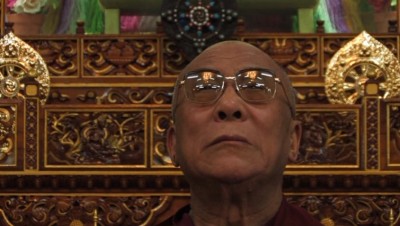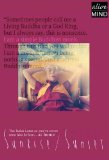| Reviews & Columns |
|
Reviews DVD TV on DVD Blu-ray 4K UHD International DVDs In Theaters Reviews by Studio Video Games Features Collector Series DVDs Easter Egg Database Interviews DVD Talk Radio Feature Articles Columns Anime Talk DVD Savant Horror DVDs The M.O.D. Squad Art House HD Talk Silent DVD
|
DVD Talk Forum |
|
|
| Resources |
|
DVD Price Search Customer Service #'s RCE Info Links |
|
Columns
|
|
|
Sunrise/Sunset
Narrated in Russian by the filmmaker, with English and Tibetan dialogue, and English subtitles, the conceit of Sunrise/Sunset is a routine day in the life of the Dalai Lama at his compound in Dharamsala, India, where he has presided over the Government of Tibet in Exile since 1959. The Dalai Lama's day begins before 5 AM with meditation and religious observation in the form of repeated prostrations, followed by brisk walking on a tread mill, and then breakfast, the heartier of his two daily meals.

Following breakfast, the Dalai Lama and the filmmaker discuss politics, theology, and philosophy on the veranda. The Dalai Lama reveals that he may choose to be reincarnated outside of Chinese-controlled Tibet. In discussing theology, he shares his belief that all major world religions share a universal message, but superficially diverge for cultural reasons. Discussing the conjunction of philosophy and theology, the Dalia Lama expresses his belief that essential human values are innate, while religious dogma is learned.
Following their interview, the Dalai Lama proceeds to an outer courtyard where a large audience of Buddhist monks and nuns, pilgrims, and world travelers are assembled to hear him lecture. These sessions which can last for up to five hours, are far-ranging in their subject matter. The segment which Mansky captures relates the scientific theories of the Big Bang and Darwinism to theology and the human condition. While lecturing, the Dalai Lama sits cross-legged on a raised dais, speaking Tibetan into a headset microphone while his non-Tibetan-speaking audience follows along via translations provided either live through interpreters with microphones, or via personal audio players from a prepared script.
At the end of his lecture, the Dalai Lama shares lunch, his last meal of the day, with his audience, then heads off to an audience with a more select group of international visitors from the political class. Following this, he retreats to his office where he again grants an exclusive audience to the filmmaker while channel surfing. A nature documentary about tigers catches his interest until he happens upon an interview he gave to his favorite network, BBC World.
By sundown, the Dalai Lama retires to his personal chambers, and the documentary shifts to the filmmaker's long return journey to Russia via China, with extensive musings via voiceover by the Dalai Lama and the filmmaker about the future of Chinese and Russian relations. I suspect this post-script which consumes about twelve of this cut's 72 minutes may have been longer in the original festival cut which clocked in at 94 minutes.
Presentation
Video & Audio:
Sunrise/Sunset is presented in anamorphic widescreen (16:9). Apparently shot on HD video, the image looks fairly good despite being interlaced. Colors are realistic, contrast is good, and detail is mostly fine despite the effects of the interlacing.
The mixed Russian, English, and Tibetan audio is presented in stereo with forced subtitles. The audio quality is completely satisfactory for a documentary of this kind with no dropouts or distortions, albeit with little dynamism either.
Extras:
Other than a trailer for this documentary, there are no extras on this release.
Final Thoughts:
Although it is not necessary to know anything about Tibetan Buddhism or the Dalai Lama to appreciate this documentary about a compassionate public figure, viewers who are already familiar with the subject matter will enjoy this documentary far more than those seeking an introduction to Tibetan Buddhism and its leader.
|
| Popular Reviews |
| Sponsored Links |
|
|
| Sponsored Links |
|
|
| Release List | Reviews | Shop | Newsletter | Forum | DVD Giveaways | Blu-Ray | Advertise |
|
Copyright 2024 DVDTalk.com All Rights Reserved. Legal Info, Privacy Policy, Terms of Use,
Manage Preferences,
Your Privacy Choices | |||||||














